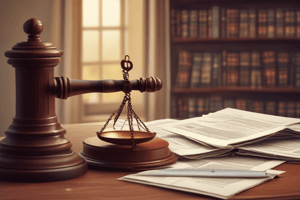Podcast
Questions and Answers
What is required for a person to be deemed guilty of believing goods are stolen?
What is required for a person to be deemed guilty of believing goods are stolen?
- Actual knowledge or belief that the goods are stolen (correct)
- Possession of the goods for a certain period
- Mere suspicion of the goods being stolen
- Witness testimony confirming the goods were stolen
Which action indicates circumstantial evidence of guilty belief regarding stolen goods?
Which action indicates circumstantial evidence of guilty belief regarding stolen goods?
- Displaying the goods publicly
- Hiding the goods (correct)
- Returning the goods to a store
- Sharing the goods with friends
How is 'receiving' defined in relation to possession of stolen goods?
How is 'receiving' defined in relation to possession of stolen goods?
- Finding stolen goods in a public area
- Purchasing goods at a lower price
- Owning goods without any suspicion
- Receiving control or possession from another person (correct)
What can be inferred if a person intends to return stolen goods to their rightful owner?
What can be inferred if a person intends to return stolen goods to their rightful owner?
Which scenario exemplifies 'arranging to receive' stolen goods?
Which scenario exemplifies 'arranging to receive' stolen goods?
What does receiving not require according to the defined rules?
What does receiving not require according to the defined rules?
In a court case regarding dishonesty, who ultimately determines if dishonesty is present?
In a court case regarding dishonesty, who ultimately determines if dishonesty is present?
What is a common misconception about knowledge concerning stolen goods?
What is a common misconception about knowledge concerning stolen goods?
What does the term 'realisation' refer to in the context of handling stolen goods?
What does the term 'realisation' refer to in the context of handling stolen goods?
Which of the following describes 'retention' of stolen goods?
Which of the following describes 'retention' of stolen goods?
In which scenario is a person considered to be 'assisting for the benefit of another'?
In which scenario is a person considered to be 'assisting for the benefit of another'?
What determines if an offender is not considered as assisting in the handling of stolen goods?
What determines if an offender is not considered as assisting in the handling of stolen goods?
Which action would NOT be classified as 'removal' of stolen goods?
Which action would NOT be classified as 'removal' of stolen goods?
Which of the following examples illustrates an 'undertaking' in the context of stolen goods?
Which of the following examples illustrates an 'undertaking' in the context of stolen goods?
Which of these actions is an example of 'disposal' of stolen goods?
Which of these actions is an example of 'disposal' of stolen goods?
What is required for someone to be considered to be 'assisting' another in handling stolen goods?
What is required for someone to be considered to be 'assisting' another in handling stolen goods?
Under what circumstances do goods cease to be considered stolen?
Under what circumstances do goods cease to be considered stolen?
What happens to stolen goods when a person with knowledge of the theft pays a debt using those goods?
What happens to stolen goods when a person with knowledge of the theft pays a debt using those goods?
Which statement correctly reflects the concept of acting 'by or for the benefit of another' in relation to stolen goods?
Which statement correctly reflects the concept of acting 'by or for the benefit of another' in relation to stolen goods?
How can dishonesty be proved when it comes to handling stolen goods?
How can dishonesty be proved when it comes to handling stolen goods?
What happens to the status of a stolen item when it is given to someone who has no knowledge of its stolen nature?
What happens to the status of a stolen item when it is given to someone who has no knowledge of its stolen nature?
In what section of the Theft Act (Northern Ireland) is the power to search for stolen goods addressed?
In what section of the Theft Act (Northern Ireland) is the power to search for stolen goods addressed?
What constitutes as evidence that a handler knew or believed the goods to be stolen?
What constitutes as evidence that a handler knew or believed the goods to be stolen?
What is the legal implication of an individual receiving stolen goods despite knowing their true nature?
What is the legal implication of an individual receiving stolen goods despite knowing their true nature?
What must be proven for a charge of handling stolen goods to be applicable?
What must be proven for a charge of handling stolen goods to be applicable?
What is the maximum sentence for handling stolen goods compared to theft?
What is the maximum sentence for handling stolen goods compared to theft?
Which of the following is NOT included in the definition of goods?
Which of the following is NOT included in the definition of goods?
In what situation can the original thief be convicted of handling stolen goods?
In what situation can the original thief be convicted of handling stolen goods?
What does 'merely suspicion' imply in the context of handling stolen goods?
What does 'merely suspicion' imply in the context of handling stolen goods?
If a good was obtained through fraud in Northern Ireland, how is it categorized?
If a good was obtained through fraud in Northern Ireland, how is it categorized?
Which action implies that the defendant acts for their own benefit in handling stolen goods?
Which action implies that the defendant acts for their own benefit in handling stolen goods?
What must a person do to be charged with handling stolen goods for another person's benefit?
What must a person do to be charged with handling stolen goods for another person's benefit?
Flashcards are hidden until you start studying
Study Notes
Handling Stolen Goods
- Handling Stolen Goods is an offence that requires a theft to have already been committed.
- The defendant must 'know or believe' the goods are stolen; mere suspicion is not enough.
- The maximum sentence for handling stolen goods is 14 years, more serious than the 10-year maximum for theft.
- Handling stolen goods can be categorized into two scenarios:
- The defendant acting for their benefit, such as receiving or arranging to receive stolen goods.
- The defendant acting for the benefit of another person, encompassing all other elements of the offence.
Stolen Goods
- Stolen goods include money and any other property (except land).
- Goods obtained through fraud or blackmail in Northern Ireland are considered stolen goods.
- Goods obtained in a foreign country are considered stolen if the offence committed would also be an offence in Northern Ireland.
- Goods obtained in the rest of the UK are also considered stolen goods in Northern Ireland.
"Otherwise Than in the Course of Stealing"
- The original thief cannot be convicted of handling stolen goods for their actions at the time of the theft.
- A thief can later become connected to handling stolen goods if they participate in transactions involving the retention, removal, realisation, or disposal of the stolen goods, particularly if it is “by or for the benefit of another person".
- An example of handling after theft is a thief who receives money for stolen goods and later assists in loading those goods onto a truck, benefiting another individual.
Knowing or Believing
- The defendant must actually 'know' or have a genuine 'belief' that the goods are stolen, not merely suspect it.
- Circumstantial evidence, such as hiding goods, altering serial numbers, or paying a low price, can be used to establish guilty belief.
Dishonesty
- Dishonesty is a key element in handling stolen goods.
- The defendant must lack a claim of right to handle the stolen goods and must not have been authorised by the owner.
Receiving
- Receiving requires gaining control or possession of stolen goods from another person.
- Simply finding stolen goods does not constitute receiving.
- A receiver may receive goods knowing or believing them to be stolen but may not be guilty if they intend to return the goods to the rightful owner or report the theft to the police.
- The intention to return the stolen goods is a key element that a jury must consider.
- Receiving can extend to exercising control over things in action, like stolen bank cards.
Arranging to Receive
- The goods must be stolen at the time of the arrangement.
- The arrangement must be a concluded agreement with specific details such as date, time, and price.
Undertaking for the Benefit of Another
- This involves taking action to retain, remove, dispose of, or realise stolen goods for the benefit of another person.
- Realisation refers to the sale of stolen goods.
- This can be undertaken by assisting in the retention, removal, disposal, or realisation of the stolen goods.
Assisting for the Benefit of Another
- Involves providing assistance to another, such as a thief, in retaining, removing, disposing of, or realising stolen goods.
- Any action that enables the stolen goods to be retained applies, even if it's not successful.
- Verbal assistance, such as offering to lend a vehicle to transport the stolen goods, is considered assisting.
- The person benefiting from the defendant's action must be someone other than the defendant (R v Kanwar 1982).
Retention/Removal/Disposal/Realisation
- Retention: storing or keeping the stolen goods.
- Removal: transporting the stolen goods from one location to another.
- Disposal: getting rid of stolen goods, like destroying them or changing the number plates on a vehicle.
- Realisation: exchanging the stolen goods for money or other property.
By or for the Benefit of Another
- The retention, removal, disposal or realisation must be solely for the benefit of another person.
- Receiving payment for assisting with stolen goods does not negate the action as "by or for the benefit of another".
When Goods Cease to Be Stolen
- Stolen goods cease to be stolen when they are recovered by the police or owner.
- They also cease to be stolen when they pass into the possession of someone who does not know or believe them to be stolen.
Additional Reading
- The Theft Act (Northern Ireland) Section 26, sub-section 4 allows previous theft or handling convictions to be used as evidence for believing or knowing goods are stolen.
- The Theft Act (Northern Ireland) Section 26, sub-section 5 permits a statement from the owner to prove stolen goods, and establishes that the absence of a claim of right or authorisation from the owner can prove dishonesty.
- The Theft Act (Northern Ireland) Section 25 grants police the power to obtain a warrant to search for stolen goods.
Studying That Suits You
Use AI to generate personalized quizzes and flashcards to suit your learning preferences.



